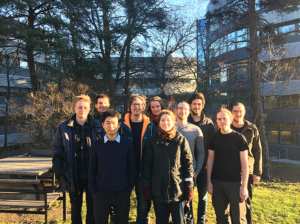Yao L, Shabestary K, Björk S, Asplund-Samuelsson J, Joensson H, Jahn M, Hudson EP*. Pooled CRISPRi screening of Synechocystis sp PCC 6803 for enhanced industrial phenotypes (2020). Nature Communications 11 1666.
The powerful CRISPRi tool was used in high-throughput to find genes whose repression improved the performance of a model cyanobacteria. We found genes related to cell growth rate, tolerance to organic acid lactate, and bioproduction of lactate, a useful commodity chemical. We also integrated screening with a cell-encapsulating droplet sorting device.
Janasch M, Asplund-Samuelsson J, Steuer R, Hudson EP*. Kinetic modeling of the Calvin cycle identifies flux control and stable metabolomes in Synechocystis carbon fixation (2019). Journal of Experimental Botany 70 973-983
This kinetic model of the Calvin Cycle allows estimation of flux control coefficients, to reveal how to best engineer the cycle for improved CO2 fixation. Ensemble sampling allows estimates of in vivo kinetic parameters and stability trends of the cycle. We report that the Calvin Cycle may become unstable when certain enzymes are saturated high above their Km values.
Jahn M, Vialas V, Karlsen J, Maddalo G, Edfors F, Forsström B, Uhlen M, Käll L, Hudson EP*. Growth of Cyanobacteria Is Constrained by the Abundance of Light and Carbon Assimilation Proteins (2018). Cell Reports 25. P478-486.
The proteome of cyanobacteria grown under different conditions was investigated by shotgun proteomics. A resource-allocation model showed that proteins involved in carbon fixation are not optimally regulated. This paper will be an important resource for basic cyanobacteria research.
Karlsen J+, Asplund-Samuelsson J+, Thomas Q, Jahn M, Hudson EP*. Ribosome Profiling of Synechocystis Reveals Altered Ribosome Allocation at Carbon Starvation (2018). mSystems 3. P1-12
First genome-wide ribosome profiling report of cyanobacteria. Ribosome profiling allows estimation of translation rate of each gene. We found that during low CO2 conditions, several genes had increased translation efficiency (#ribosomes per mRNA). Also, we saw evidence that ribosomes “hibernate” in the 5’UTR of select genes during carbon starvation. Suggests a type of ribosome sequestration.
Asplund-Samuelsson J, Janasch, M, Hudson EP*. Thermodynamic analysis of computed pathways integrated into the metabolic networks of E. coli and Synechocystis reveals contrasting expansion potential (2018). Metabolic Engineering 45 223-236
We developed the POPPY software that creates and analyzes thousands of potential metabolic pathways to different biofuels and chemicals. POPPY evaluates the potential of each pathway in terms of thermodynamic driving force that the host cyanobacteria can impart. Compared to E. coli. Will be useful in metabolic engineering.

